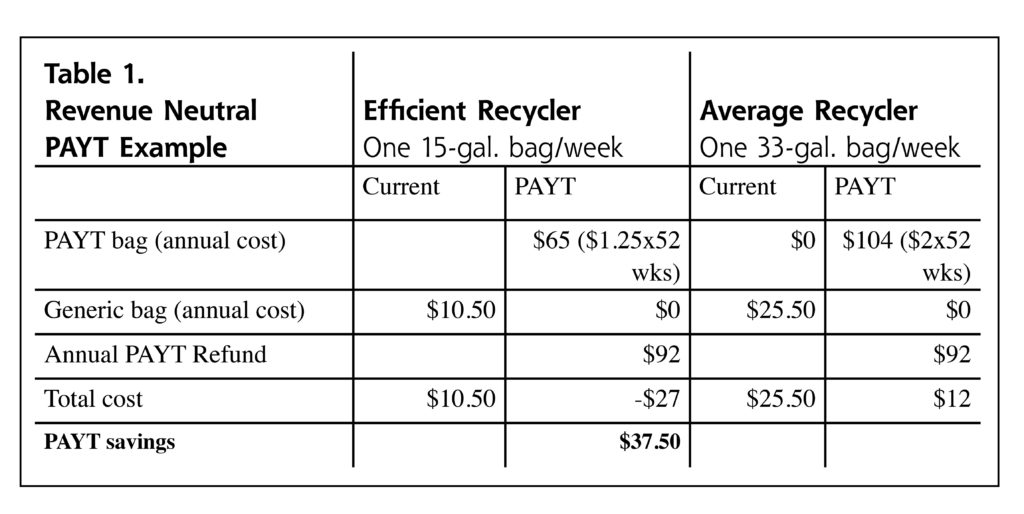Pay As You Throw Program
By Kim Slack
One hundred and forty-three Massachusetts communities meter trash the same way they meter water or electricity, creating an equitable system where those who generate more, pay more, and those who generate less, pay less. These programs are called Pay As You Throw (PAYT), or Save Money And Reduce Trash (SMART). As Belmont considers renewing its trash collection contract, it is worth exploring this approach to help the town financially and environmentally.
Massachusetts PAYT programs on average have reduced trash by 44% in their communities. When we are charged for the trash we produce, many of us will become more careful to recycle, and compost, and reduce the amount of packaging in the purchases we make. Belmont may not realize the same reductions that other communities have seen because, on average, we produce less trash. However, savings in the fees we pay for the weight of our trash are estimated to be over $115,000 per year, assuming a 25% reduction in the weight of trash. Savings could be much more if we reduce more or if tipping fees rise in the future.
If Belmont were to choose to adopt a PAYT program, there is $200,000 to $300,000 in state grant funds to facilitate the transition.
When trash is recycled, composted, or reduced (like using your own bags for groceries) rather than incinerated, it results in fewer dangerous greenhouse gas emissions that warm our planet. This is because there are fewer emissions from the incinerator, and there are fewer fossil fuels burned when new materials use recycled paper, metals, and plastics in their creation. Less trash also means less fuel in transporting waste, too.
By reducing our trash by 25% in Belmont, it would cut greenhouse gas emissions over 10,000 tons of CO2 equivalent per year, according to the EPA, which is about the same as the energy used annually by 966 homes. This would help the town achieve its Climate Action Plan goal of reducing greenhouse gases by 80% by 2050.
By reducing our trash by 25% in Belmont, it would cut greenhouse gas emissions over 10,000 tons of CO2 equivalent per year. . .
There are incentives from the state to cut down on trash, too. When Massachusetts passed the Global Warming Solutions Act in 2008, it asked towns to reduce their trash by 30% by 2020. As of 2015, Belmont still needed to slash its trash by 16% to achieve this goal. If Belmont were to choose to adopt a PAYT program, there is $200,000 to $300,000 in state grant funds to facilitate the transition, which would help to meet this goal. In addition, the Baker-Polito Community Compact, a program that encourages innovation in Massachusetts communities, considers PAYT a “best practice.”
Most PAYT programs require citizens to buy and use trash bags printed with the town’s name (and they are more expensive than supermarket bags). Local retailers who sell the bags would benefit from additional foot traffic but would have to sell them at the price the Board of Selectmen established, with all the sales proceeds returning to the town. Standard 33-gallon bags cost about $2 each; smaller sizes cost less. The average Belmont household produces less than 28 pounds of trash per week, so one $2 bag would do the job. Under PAYT, recycling would still be a free service provided by the town.
Revenue-neutral option would benefit citizens directly
The program could be “revenue-neutral” where all bag revenue (minus the wholesale cost of the bags) is returned annually to households, perhaps by sending a debit card or some other method. Taxpayers would not only recoup their costs, but there would be a financial incentive for households to reduce their trash and increase their recycling when they beat the average number of bags used per household.
Table 1 illustrates an example of how efficient recyclers could be rewarded.
 Another option would be for the town to apply the bag fee income to something that citizens care about, such as improved energy efficiency in town buildings (which would further reduce town expenses). If bag fees were to be assessed, they would be established by the Board of Selectmen, just as water and electric rates are set. Towns on a PAYT program have rarely changed their bag fees.
Another option would be for the town to apply the bag fee income to something that citizens care about, such as improved energy efficiency in town buildings (which would further reduce town expenses). If bag fees were to be assessed, they would be established by the Board of Selectmen, just as water and electric rates are set. Towns on a PAYT program have rarely changed their bag fees.
Some believed that because of a 1990 override, the Board of Selectmen do not have the authority to establish fees on trash. But in a 2010 opinion, Belmont’s legal counsel wrote that the board maintains its ability to set fees on waste collection if it so decides.
Perhaps the most challenging aspect of PAYT is the implementation. Citizens need to understand its purpose and how it will work months before it starts.
 When asked about a previous consideration of the program, state senator and former Belmont selectman Will Brownsberger said, “It’s a difficult decision for the selectmen. We looked at it when I was on the board and did not adopt it. There are good economic and environmental arguments for it, but there are also practical difficulties.”
When asked about a previous consideration of the program, state senator and former Belmont selectman Will Brownsberger said, “It’s a difficult decision for the selectmen. We looked at it when I was on the board and did not adopt it. There are good economic and environmental arguments for it, but there are also practical difficulties.”
Perhaps the most challenging aspect of PAYT is the implementation. Citizens need to understand its purpose and how it will work months before it starts. There needs to be strong communications around how it works, where bags can be bought, and, if the revenue is to be returned to citizens, when that will happen. This is why the state provides significant grants (mentioned above) for helping communities make this transition, so they have the resources to implement a program smoothly and successfully.
Belmont would gain significant savings—more than $115,000 per year—from a 25% reduction in trash. If a revenue-neutral approach were used, it would cost residents and the town almost nothing. But more importantly, we would be creating a cleaner, healthier environment for our kids.
Kim Slack is a member of Sustainable Belmont and is on the town’s recycling and waste committee.


Sorry, the comment form is closed at this time.